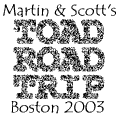Via the Shifted Librarian:
“Experiments are rife in the music business these days — and Boston will be a test market for one of the most novel of them. Clear Channel Concerts, the nation’s largest concert promoter, has ambitious plans to record live CDs of its shows and sell them to patrons within five minutes after those shows end. Clear Channel is targeting Boston as the first site for the new plan, according to sources within the organization.
Multiple CD burners would be brought in, and the live CDs would probably sell for around $15 in the same way that T-shirts and other merchandise can be purchased after concerts. No one knows what the demand would be, but the project is expected to begin at club shows within a couple of months, then be refined and work its way up to the amphitheater level, though that may not happen until next year, sources say.” (Boston Globe)
How cool is this? $15 to get a CD of a gig you’ve just been to, right after it has ended! I know that whenever I’ve just been to a good concert, I’m all jumped up on happy endorphins and almost eager to spend money on merchandise. (Unfortunately, Clear Channel is talking about trials in a “couple of months”, so the pilot will probably be to late for my road trip.)
I can see this making huge inroads into the way people get their recorded music. Rather than listening to bands on the radio, and going out to a shop to buy their CD (of which you may have heard one or two tracks), you get recommendations from friends about good concerts, and when you like one you buy the CD. Maybe there’d be more “compilation” gigs, with several bands on stage in a night, so you could sample your new music at live venues, rather than on the radio.
And this way, people wouldn’t all end up with exactly the same recording of a particular song. Because it’s live music, every gig is different. The music promoters would also start actively encouraging file sharing and swapping, because that would drive more people to their concerts. If the concert were at was particularly good, surely you’d want to have copies of those particular versions of the songs?
Yes, you could wait until someone else bought the CD and gave you a copy, but then we’re back to the fact that you’ve just been jumping and singing for two hours, you’re in a great mood, and you’re highly receptive to the idea of parting with your money.
There are a couple of articles I’ve read recently (“Piracy is Progressive Taxation” by Tim O’Reilly, and “Embrace file-sharing, or die” by John and Ben Snyder) that discuss the current battle between music publishers and the file sharing community. Anyone who isn’t in the music publishing industry (or is paid by them) seems to eventually come to the same conclusion:
File-sharing networks don’t threaten book, music, or film publishing, they threaten existing publishers.
There’s no law that says musicians and bands must go to existing publishers. If Clear Channel’s idea takes off, then it’s the concert promoters who will be the publishers of the next century. Bands won’t sign recording contracts with record companies, they’ll sign concert deals with promoters.
Will musicians end up with a better deal out of it? Maybe, but probably not. Concert promoters are in the game for the money just as much as the current record companies are, and by all accounts both industries are equally big nests of vipers. The difference is that Promoters will want the public to swap files, and will do everything they can to make this easy, while the Publishers won’t.
The public will love this, and technology companies will love it, too, because there’s a fantastic opportunity for them to make money from new hardware. The CD-R idea is just a transitional one. iPod and its lookalikes are the future of personal music players. Sooner or later, all music players will feature a firewire or USB2 port for sucking down hours of music in seconds. Concert venues will feature banks of docking cradles, or transfer cables, where you can swipe your credit card and suck down the gig in en eyeblink.
Suddendly the future of music publishing doesn’t look so grim any more. The only thing that could stand in the way of this revolution is if the current music publishers start buying concert promoters, and lock down this new business model before it can even start. That would suck.
 It has finally all come together. We got the flights. We got the hotel. And now we finally have the actual tickets for the gig… Scott and I are going to see
It has finally all come together. We got the flights. We got the hotel. And now we finally have the actual tickets for the gig… Scott and I are going to see  My grandmother was taken in to hospital earlier today. She slipped and fell while she was out shopping, and has fractured her cheekbone, and a bone in her upper arm. My parents are up in Aberdeen with her now, and they’ve reported that despite the injuries, she’s in good spirits and bearing up well. Still, it was a shock for all of us. And for grandma, too, of course 😉
My grandmother was taken in to hospital earlier today. She slipped and fell while she was out shopping, and has fractured her cheekbone, and a bone in her upper arm. My parents are up in Aberdeen with her now, and they’ve reported that despite the injuries, she’s in good spirits and bearing up well. Still, it was a shock for all of us. And for grandma, too, of course 😉